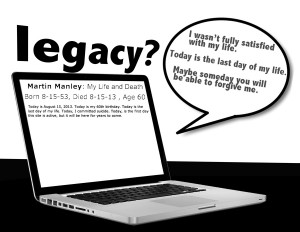Man had right to blog suicide
Martin Manley knew he didn’t want to live past 60. The thought of growing old alone or suffering from imminent health problems terrified him, and didn’t want to wait around for his last years. So, on Aug. 15, Manley decided to take control of his fate and committed suicide in a police station parking lot in a suburb outside of Kansas City, Kan.
Though most suicides are met with painful questions that can never be answered, Manley ensured that those questions would never have to be asked. The blogger and former sports reporter left behind something other than a typical handwritten suicide note: for more than a year, Manley had been secretly creating an intricate website about his life, including an explanation of his decision to end it.
The website is extensive, with 34 categories and 44 subcategories that allow readers to sift through the various time periods and areas of interest of Manley’s life. Perhaps most disturbing, however, is Manley’s in-depth explanations and testimonials as to why he took his own life and why he decided to create a website to be published on the day of his death.
“After you die, you can be remembered by a few-line obituary for one day in a newspaper when you’re too old to matter to anyone anyway … OR you can be remembered for years by a site such as this,” Manley writes on his website. “That was my choice and I chose the obvious.”
Though Manley prepaid Yahoo to host the site for five years, Yahoo claimed that the material was “harmful” to users and proceeded to take the site down, according to a report by CNN. And while it is possible that viewers could find the site to be overly morbid and argue that it encourages suicide, this is a complete disregard for Manley’s final wishes. Manley specifically states on the site that encouraging suicide was not his intent.
His main goal was to leave a piece of himself behind and to be immortalized on the Internet for years to come, and this goal should be respected. He wanted to not only provide an explanation for his act of self-destruction, but also preserve his life online forever. He explained his likes and dislikes, the story of his first love, his theories and thoughts on complicated issues, and so much more.
He wanted the world to know his story, and he deserves to be given that. Authors, artists and celebrities are often immortalized in their work — why shouldn’t everyone be allowed that same amount of self-preservation? The web opens up all sorts of opportunities for the average Joes and Martin Manleys of the world to leave a piece of themselves behind after they have passed away — Everyone wants to be remembered.
The Internet has become an integral part of our lives, and irreversibly entangled with the goings-on of the physical world, as users continue to post daily updates to sites and blogs about their daily activities as well as major life events. In the current digital age, people share the joys and sorrows of their lives through the Internet. Deaths should be no exception.
Yahoo deemed the site inappropriate, but what they failed to realize is how very appropriate sites such as these can be: Death is a part of life, and it too has its place on the web.
“Even one generation back, so little is really known about the vast, vast majority of people,” Manley wrote. “It’s a shame — especially considering existing technology has enabled us to store everything ever said, done or thought by every person on earth a thousand times over. There is no reason lives have to continue to be forever forgotten.”
Manley is right. The Internet does allow a sort of everlasting time capsule for those wishing to leave behind a legacy. Though the conditions of Manley’s death were unfavorable and should not be an inspiration to others, he revealed the Internet’s capacity to preserve a memory and help loved ones cope with a loss. Yahoo and other website providers should recognize and embrace the web’s potential not only to celebrate users during their lives, but also in their deaths.
Cecilia Callas is a junior majoring in print and digital journalism. Her column “Tech Talk” runs Wednesdays.
Follow Cecilia on Twitter @ceciliacallas

